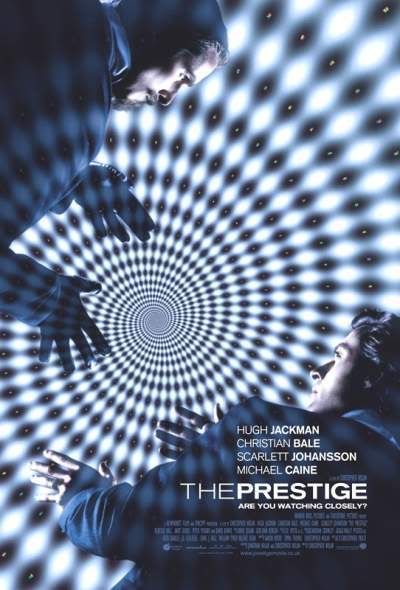
Of chief interest here is the relationship between "The Prestige", "Batman Begins" and the upcoming "The Dark Knight", envisioning this trio of Nolan/Bale/Caine films as a secret trilogy. When I first viewed "Batman Begins" I thought it was well done, but it was viewing "The Prestige" that made me realize just how sophisticated Nolan's treatment of Batman really was. Likewise, I'm theorizing that "The Prestige" equips us/sets us up for the next act of this presentation.
Part I of this article detailed the components utilized to synthesize the Nolan take on the Batman mythos, while Part II examined the presentation of the film itself, and its application of esoteric symbolism as a work about Mystery Initiation. As we should expect we find this pattern continue into "The Prestige", apparent in the poster above, which uses visual imagery in a manner that succinctly denotes the content of this film. The two magicians, mirror images of one another, positioned in opposition before an initiatory checkerboard pattern presented as a spiral, creating a work of Op Art. This is a very direct and simple statement of intent by the film makers, namely that they are purposefully playing tricks with your eyes. Note that this is a left-turning or downward spiral, an emblem of destruction.
There is a wonderful enigmatic quality to "The Prestige", leaving the final pieces of the puzzle to the viewer to fit into place. Naturally there was some debate over what was depicted in the film. Because, if the secret has been kept, the standard reaction to what we see is stunning, not because of its thematic implications, but because of the unexpected disruption of what we're conditioned to believe are the conventions of genre works. What seems to be a psychological thriller and a period piece, is suddenly resolved as a work of science fiction.
Of course debating the matter resolves absolutely nothing. There is no answer beyond what is presented on the screen. This is because of a simple matter that actually confirms the over riding point of this series of articles. Art is magic, and the execution of a work of art is a magic trick. In the supporting material included with the DVD of "The Prestige", director/co-writer Christopher Nolan states that "The Prestige" is "-about film making". It could not be stated any more plainly then that. With "The Prestige" Nolan is identifying film with illusionistic magic/sleight-of-hand/prestidigitation/legerdemain. Naturally this is an attitude that must extend to his other works, including the films that bookend this movie, "Batman Begins" and "The Dark Knight". Here's the more familiar poster of the film, Bale and Jackman facing away from one another, separated by Johannson as blue smoke.
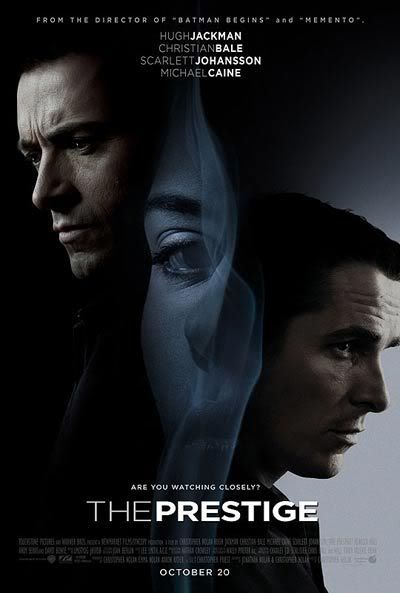
"Are you watching closely?"
It's the first line of the film, a question asked of the viewer in a voice over by Christian Bale as Alfred Borden. Immediately following Michael Caine's character, John Cutter (a name suggestive of the story of John the Baptist) presents the three steps involved with the presentation, the selling, of an act of illusionistic magic, the Pledge, the Turn and the Prestige as we've already discussed. Further, these three steps work nicely as a reference to a three step initiation process, as the art of stage magic is utilized as a metaphor for Mystery itself (and we could further muse that a story detailing the conflict between two individuals cognizant of a Secret Tradition says essentially the same thing as "Night Watch" in a different way).
As these voice overs take place we're presented with images from throughout the film that is to come, because this is the Pledge, and the magician is showing us the props he's going to use. Predominantly we see Cutter and a young girl to whom he's showing a disappearing Bird trick. The room is full of Birds, canaries in cages. If you've been reading this series on the esoteric Batman, and Inside The Cosmic Cube in general, you know how pertinent I find a film of this nature that opens with Birds. The Secret Language is being spoken, and of course it is in this movie. In "The Prestige" there is an exoteric symbolic association made between Caged Birds , certain characters within the film in specific instances, and in general to the "Man in the box", the figure or item in a magic trick who disappears as compared to that which the audience sees reappear, the subject of the Prestige. Because it is the reappearance, the Prestige, that completes the equation, and allows the full emotional reaction of the viewer to be experienced. This is an artist/audience dynamic shared by legerdemain, theater and film, comic books, and sometimes music, as the process involves an experience through time. Also, we might note, that the Caged Birds further signify the audience itself, as the viewer's sensory experience is completely at the mercy of the presenter. We are Caged, our perspective is locked, and there's nothing we can do about it.
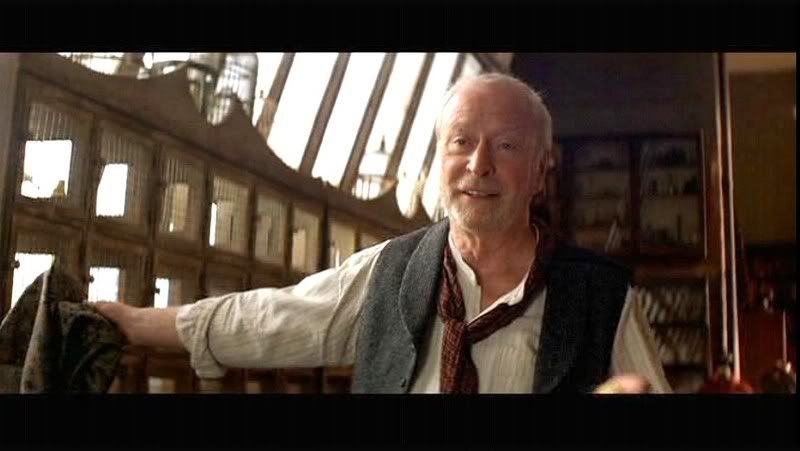
As Cutter presents his trick we see a man (Alfred Borden played by Christian Bale) sneaking backstage at a magic show, removing a Disguise along the way. False identities, alter egos and disguises are as important to "The Prestige" as they are to "Batman Begins". We see a Blind stagehand, a clever way to emphasize the preservation of a Secret as the detail of most fundamental importance, a literal device in the course of the story, and figurative, especially as an image emphasized here at the beginning, during the Pledge. We then follow Borden as he discovers another man (Robert Angier/Hugh Jackman) trapped in a water tank. Both men seemed surprised, but the tank is locked, and Angier drowns.
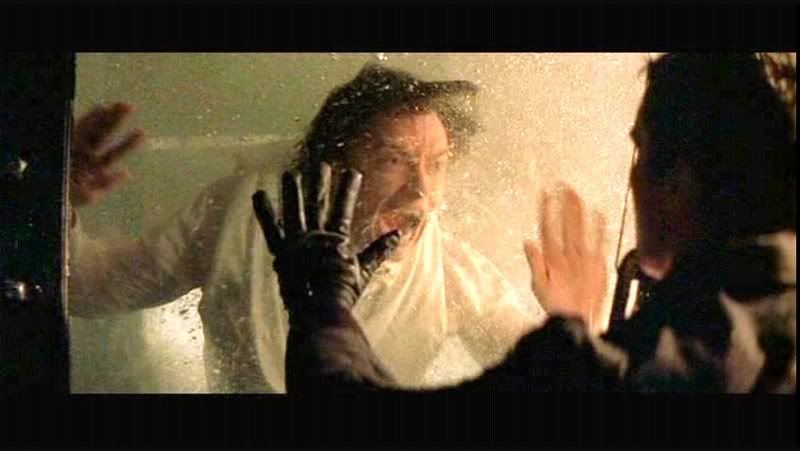
Note the strange interaction we find at a synchronistic level relating water and caskets between these works, the deadly Water Tank used throughout "The Prestige", the Coffin-shaped Batmobile from "Batman Begins" that enters the Underworld through a Waterfall (racing against the clock to save Rachel Dawes from Drowning in her fear), and even Morgan Freeman, at least thirty years ago, on "The Electric Company" (which is likewise oddly significant to "The Prestige" as you know because you've seen it, right?), playing a Vampire, a Dionysian Bat-Man, in the truly strange act of taking a Bath in a Casket. Is it just me? These symbols together are Birth and Death. Water of course is further symbolic of Rebirth. The combination of Death and Rebirth then emphasizes the Cycle of the process.
Borden is caught backstage on the scene by Cutter, who instantly accuses Borden of orchestrating Angier's death. Borden is tried and, largely on the testimony of Cutter, sentenced for the murder of Robert Angier to death by hanging. We then see Borden in Prison. Note how this parallels the opening sequence of "Batman Begins", both presented out of linear chronology, with characters played by the same actor. Borden, whose prison ID tag is labeled "D 23" for fans of the Law of Fives, meets with a lawyer representing a Lord Caldlow, who is interested in purchasing the condemned illusionist's secrets, specifically offering to provide for Borden's daughter's future in exchange. The lawyer, Owens (played by Roger Rees, who is perhaps most famous for his recurring role on the sitcom "Cheers" as the aristocratic Robin Colcord, and as the Sheriff of Rottingham in Mel Brooks' "Robin Hood: Men In Tights", primarily a parody of "Robin Hood: Prince of Thieves" which featured Morgan Freeman) suggests that Borden himself is "-no stranger to the Workhouse", meaning Borden is himself an orphan, another trait he shares with Bruce Wayne, and many other presentations of the Hero's Journey. Note here that just as in "Batman Begins", Bale's character is imprisoned, and in jail offered a bargain he can't refuse.
As a gesture of good faith Owens presents Borden with Angier's journal. This device, of narratives presented from portions of the characters' personal writings, is adopted from the novel the film is based upon by Christopher Priest, which is entirely epistolary. This allows for an unusual but potent storytelling technique for a movie, that the narrative, or portions of the narrative, is unreliable, especially so as Borden and Angier are engaged in their complex, long-term battle of wits, in which a false testimony might be planted in their writings to purposefully mislead their antagonist.
Borden reads Angier's journal, and the narrative follows, now a few years in the past as Angier travels by train to Colorado on a quest, in his own words, "-a cipher, an enigma, a search for answers". Angier is literally on a journey of Enlightenment in the Mountains. Note that Act I of "Batman Begins" likewise introduced imagery of Trains and a Mountain Quest. Angier's destination is Colorado Springs, with a Spring of course being the surfacing point of an Underground Stream. And Angier is in the right place, as the town itself is Illuminated, fully electrified, a quality that was magical in the 1890s. Angier is in Colorado Springs to meet with Nikola Tesla, and Angier must specifically climb up a mountain to meet the real life wizard. At the electrified gate, again an item of magic in this setting and period, Angier meets Tesla's apparently sole assistant, the impish Mr. Alley, played by Andy Serkis. Serkis has played many interesting roles, most notably providing the motion for the computer animated King Kong and Gollum in "The Lord of the Rings" trilogy.
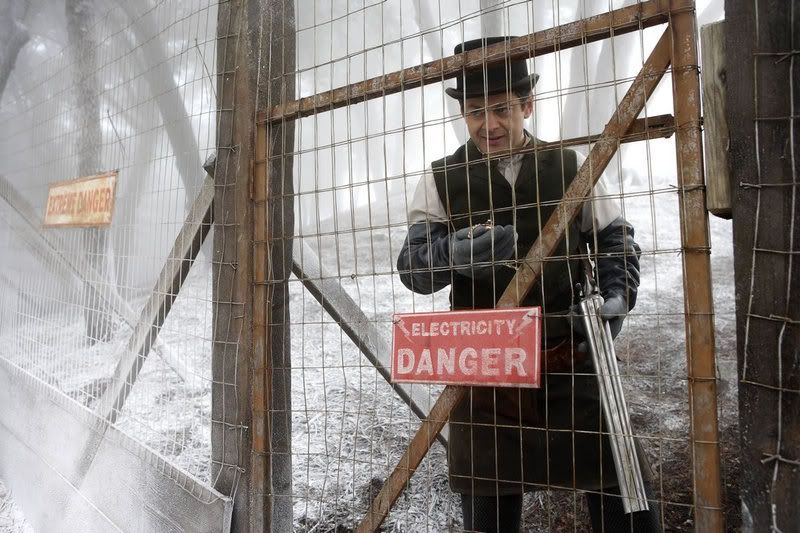
And note how the Gate Keeper, Mr. Alley (an Alley being a way through), is first presented behind an initiatory grid (a magical one at that). Appropriate for his role, he recognizes Angier by his stage name, the Great Danton. Alley states that he saw Danton's act Seven times, and was impressed that Danton could guess every object in the audience's pockets. Interesting that this is the question that Golem could not answer when he and Bilbo played Riddles in the Dark in "The Hobbit", in a maze-like Underworld shared with the Goblin King. "What have I got in my pocket?", asked Bilbo. Golem couldn't guess, but the answer was of course the Ring. Alley denies Angier entrance to Tesla (cast perfectly with David Bowie, the Goblin King of "Labyrinth"). As Angier leaves Alley asks Angier to guess what he's holding. Angier correctly answers that it is Alley's Watch. Time and timing are fundamental to this and all acts of magic.
Back at his hotel Angier reads from Borden's encoded journal, and the narrative shifts back once more, several years this time, to when Borden and Angier were both working as ringers for Milton the Magician during his performances in London at the Orpheum Theater. The Orpheum is a very common and traditional name for a theater, and is of course a reference to of Orpheus, a major Mystery Rite figure with key decapitation symbolism associated with his mythology.
We see Milton performing his top act, the Crystal Water Cage, before a backdrop featuring the image of a Triumphal Arch on the stage backdrop. This is a form seen throughout the film in various places, and an interesting device as a symbol of royalty and triumph in war, and a simple form composed of Twin Columns.
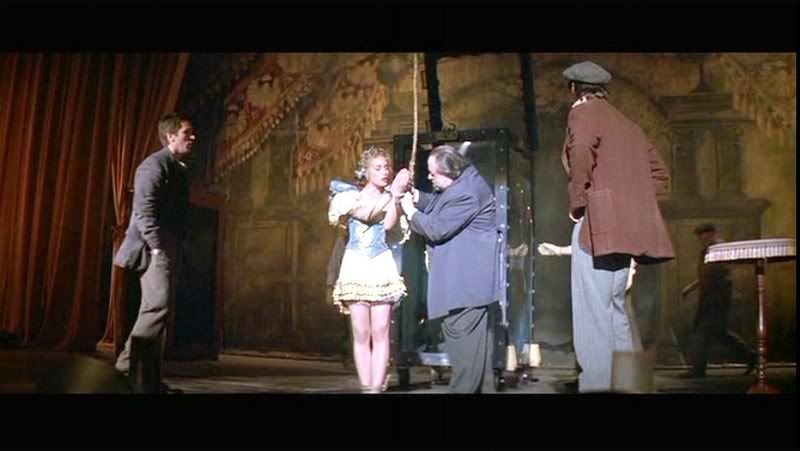
The Twin symbolism is repeated in the stage decoration, which features a pair of water tanks with twin mannequins on either side of the stage, reemphasizing the key nature of the Water Tank trick in Milton's act and to the film in general.
Milton announces the Water Tank trick and calls for volunteers from the audience. The chosen volunteers are of course the ringers, Borden and Angier. Milton's assistant, Judith (Piper Perabo), the woman being placed within the water tank, the actual performer of the trick, is married to Angier. We also see Cutter, at this time Milton's ingénure, in the wings, holding an ax in preparation for something going wrong. Because while this is an illusion there is still inherent danger involved. Borden's job is specifically to tie Judith's hands with a knot she'll be able to slip underwater.
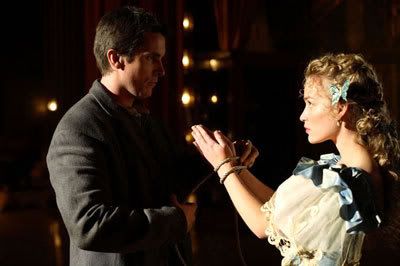
Note the Blue Butterfly Judith wears in her hair for this performance. This is a key indicator of Transformation, and a reference to the story of Psyche. Judith is lowered into the tank, a curtain drops, and Cutter starts a stop watch timing the stunt. The curtain falls to the grounds, and Judith is revealed freed from her bonds and standing beside the tank, the trick a success.
Backstage Cutter, Borden, Angier and Judith discuss Milton and the act, which quickly turns into a philosophical debate between Borden and Angier, specifically regarding dedication and personal sacrifice by the magician for the sake of the act. During this conversation Borden claims to have a trick that can't be topped. Cutter directs the two of them to view the magic show of Chung Ling Soo, and offers the one of them that can determine how Soo pulls off his gold fish bowl trick a meeting with a theater promoter to whom they could pitch an act of their own. It is Borden who is able to see through the mystery, deducing that the feeble, elderly appearance of Chung Ling Soo is a disguise, masking the high level of physicality it would take to pull off his tricks. It is an illusion that Soo must dedicate his entire life to, an alter-ego he must maintain at all times to protect his "secret identity". Borden stresses that maintaining a Secret is the only means to escape solid reality, suggestive that his concept of true magic is transcendence.
This attitude coincides with Borden's working class background, his desire to rise above his station. And this is the key dichotomy presented between Borden and Angier. Following his viewing of Chung Ling Soo we see Angier and Judith, and it is revealed that Robert Angier is itself an assumed name, another secret identity, which he took on in order not to embarrass his family with his theatrical endeavors, suggestive of an upper class background.
Cutter states that Borden also works moving props for a magician named Virgil, and that Cutter hired Borden to steal Virgil's "Orange Trick". Though this trick is never shown or further described its noteworthy that the movie "The Illusionist", the rival 2006 Victorian-era stage magic drama, featured a prominent Orange Trick. We see Virgil perform a disappearing Bird trick, which greatly upsets a young boy in the audience, who believes the bird has been killed. He remains convinced even after the bird is made to reappear. Borden brings the bird to the boy to show him that it is okay, but the boy sees through the trick and asks, "What about his brother?".
This is when Borden meets Sarah (Rebecca Hall), his future wife, the caretaker of the child. Borden calms the boy down by teaching him an act of sleight of hand, a way to make a coin appear to have Two heads, stressing to never let anyone know the Secret, because once you do you're nothing. Later we see Borden removing the carcass of a crushed canary from a hidden panel of Virgil's performance platform. The boy was correct, the disappearing act requires a sacrifice. This is an important statement, demonstrating that the Prestige, the reappearance, can be as much an illusion as the Turn, the disappearance. Virgil's stage set features an Egyptian motif, including a matching pair of pharaoh statues.
Now we see Milton's Crystal Water Cage trick again, but this time it is apparent that Borden ties a knot on Judith's wrists that Cutter was opposed to (though a sleight nod of the head indicates Judith's agreement to Borden's alternate knot). But she's unable to slip it, with her hands bound can't remove herself from the tank, and Judith drowns. At her funeral Borden states that he can't recall which knot he tied, that he's been fighting with himself over the matter, but remains uncertain. This piece of information pushes the already grief stricken Angier over the edge.
One of the consequences of Judith's death on stage is the end of Milton's career. A short time later, after Borden and Sarah have married, we see Borden working small, rowdy venues under the stage name "The Professor", like Doctor, a title that can be utilized in fictional settings to indicate Secret Teachings, as it is the name of an educator of the Invisible (abstract) College. This especially so as this is a stage name only, a false identity. The Professor's top trick is a bullet catch. In Borden's workshop we're introduced to the silent and obscure Mr. Fallon, Borden's Ingénure, and learn that Sarah is pregnant. Borden then demonstrates to Sarah the illusion behind the Bullet Catch trick. The bullet only appears to be placed in the gun, but is actually palmed, the catch entirely mimed. When she expresses disappointment in just how simple it really is, he points out that the trick is still dangerous as the audience member who fires the gun might stick an object or even a real bullet in the gun. In this scene Sarah also states that sometimes Alfred loves her and sometimes he does not, and that she can tell the difference. Note that if the following shot of Borden in his workshop were set in a cave it could be a still from "Batman Begins".
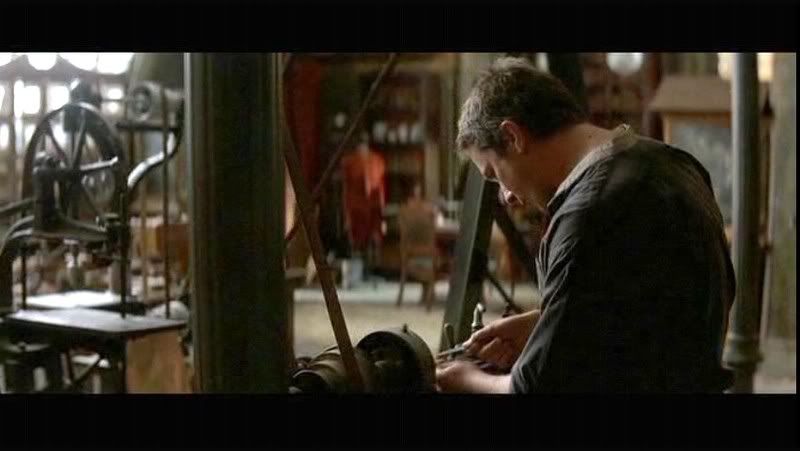
We see a performance of the Bullet Catch by The Professor, but the man chosen from the audience to fire the empty gun is Angier in disguise. He slips a bullet into the gun, points it at Borden and asks him again which knot he tied. Borden still can't answer. Angier fires but Fallon knocks the gun down, the bullet strikes Borden's left hand, ironically he really catches the bullet, and his ring finger and pinky are blown off.
Following this we see Cutter contact Angier, through the strange device of a miniature playing card stuck to the bottom of Angier's glass at a pub. It's hard to rationalize why he makes contact in this unusual manner rather then simply talking to Angier. It is communication through covert symbolism for the sake of covert symbolism. The card Cutter uses appears to be the King of Diamonds, which is also the King of Pentacles or Coins. Pentacles is the suit representing Earth. I find this communicates Cutter's more terrestrial, concrete motivation as compared to Angier and Borden, that of earning money. Cutter wants to get back in the business and needs to work with someone who realizes that the accident with Judith was not Cutter's fault.
The two set forth preparing the act of the Great Danton (a stage name Angier insists upon because it was suggested to him by Judith). They rent a space to use as a workshop, and Cutter hires Olivia (Scarlett Johansson) as Angier's assistant, stressing the important role of a beautiful assistant to act as a Distraction. As Olivia's training is shown we see Cutter place her in a box that would be used to make a magician's assistant disappear. We also see Cutter fitting Angier with a mechanized device to be worn under his clothing that would allow for a non-lethal version of the disappearing Bird trick.
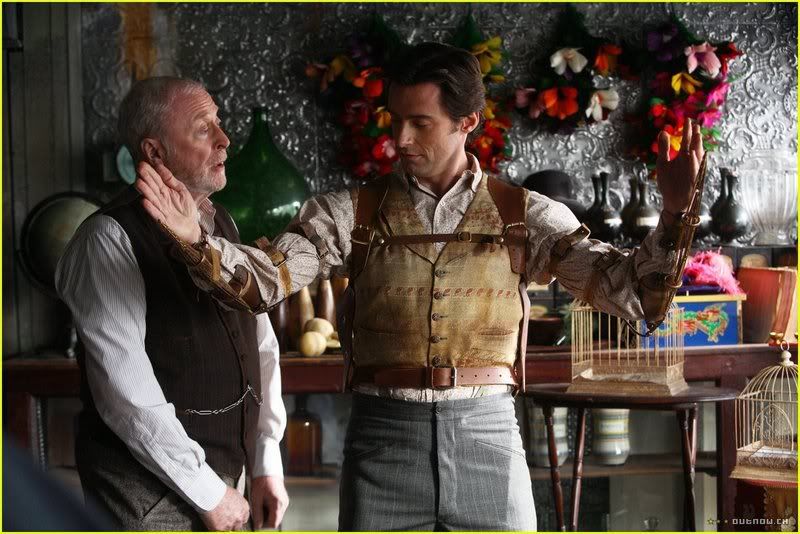
Note the high similarity here to Act II of "Batman Begins" when Alfred and Bruce Wayne set up the Batcave and developed Batman's various devices. It is also interesting how, as seen in the still above, the workshop prominently displays silk flowers, obvious props from the Great Danton's act, that in this instance is suggestive of a False Garden.
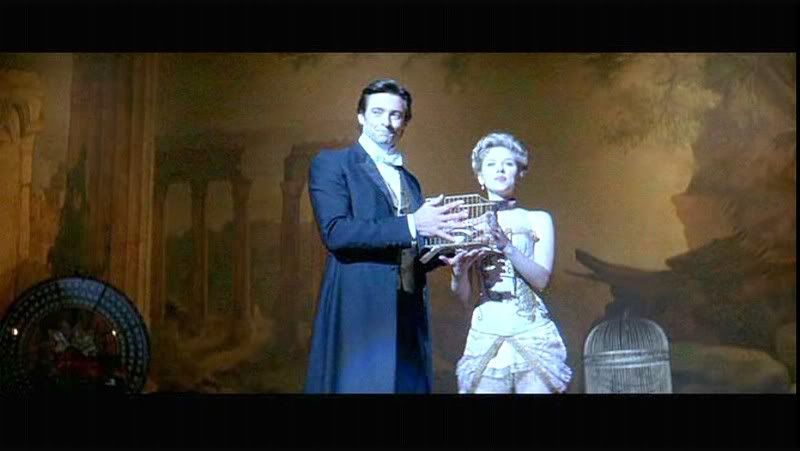
Note the Romantic backdrop, columns and arches in ruin, and the Wheel of Fortune on the stage. Difficult to see is Olivia's Rose detailing on her costume and in her hair. Her character is depicted with floral, primarily Rose, emblems throughout the movie. This Disappearing Bird trick, as opposed to Virgil's, involves a Dove held suspended in a cage by two members of the audience. But on the first night of the Great Danton's performance Olivia happens to choose a disguised Borden out of the audience. Angier recognizes Borden too late, Borden springs the collapsible cage, which kills the Dove and breaks fingers of the other audience member. This event causes Angier's booking at the theater to be canceled.
With their top trick spoiled, Cutter sends Angier to a science expo to look for new angles or concepts for the act. Angier attends a lecture of Tesla, where the scientist's dramatic, but not dangerous Tesla coils are shooting electricity throughout the room. The demonstration is canceled due to the perceived, but non-existent danger. We see Tesla's assistant Alley loudly denouncing the cancellation as a part of Thomas Edison's smear campaign against Tesla, introducing the pattern of rivalry as existing between the true wizards as well as the illusionists. Angier sees Borden in the audience and as the hall is cleared out he covertly follows his enemy, witnessing Borden with his young wife and new born child, Jess. Angier sees this as Borden receiving the life that Borden stole from Angier.
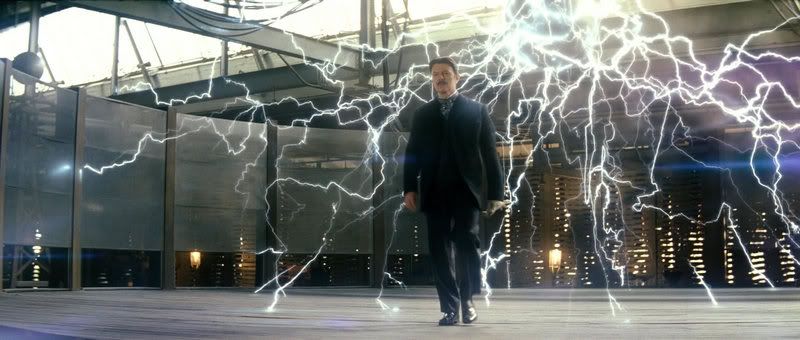
Time then moves forward again to Angier's continued efforts to meet with Tesla. Bowie's Tesla is finally introduced, entering dramatically , magically, through a lightning storm of his own generation. Tesla and Angier shake hands, and Tesla demonstrates the human body's ability to act as a conductor, the two of them forming a circuit that lights a bulb, literally an Illuminated handshake, perhaps symbolic of the type of exchange that might take place between strangers who are both cognizant of the same Mysteries.
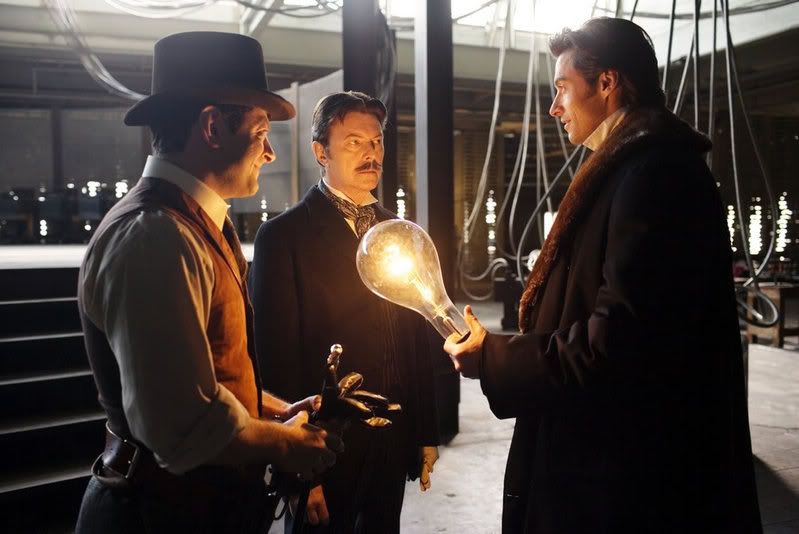
Tesla warns Angier of the cost of magic, something Angier believes he already knows about, but Tesla agrees to construct a machine for Angier, though it will take time and cost a great deal of money (a factor that is not a concern of the secretly aristocratic Angier). We can note how nicely the figure of Tesla, at this point in his life practically in exile, works as a Promethean character, his role comparable to that of Lucius Fox in "Batman Begins".
While he waits Angier continues to decipher Borden's diary, and we now see the time when Borden revives his career as The Professor, with his top trick now being The Transported Man. The trick involves two cabinets positioned at the far sides of the stage. The Professor bounces a ball, steps into one cabinet, then immediately emerges out of the second cabinet to catch the ball. As we see this act first performed, the introduction by Borden of a higher Secret/magic, we can note the stage decorated with a prominent five-point star.
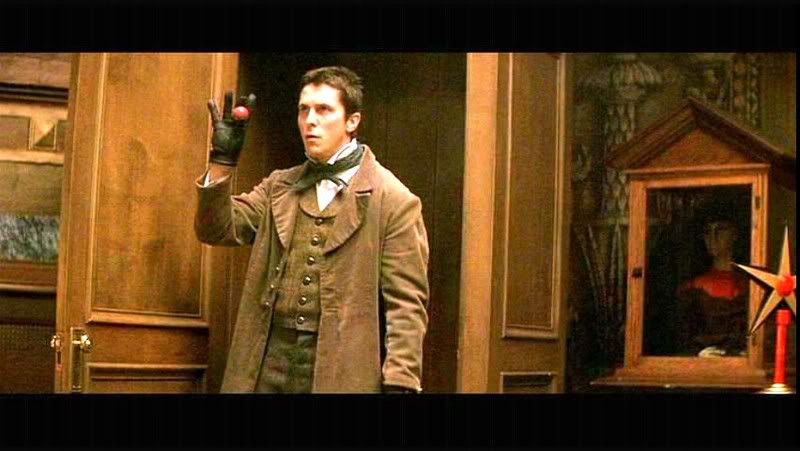
The general audience for the act is barely responsive to this but Angier is amazed, unable to determine how Borden is pulling off the illusion. Cutter insists that Borden must be using a double, but Angier disagrees. Olivia sides with Angier, noting that both the disappearing and appearing man are wearing a padded glove to hide his missing fingers. The trick is brilliant, but Borden lacks the showmanship to successfully engage the audience with it. Angier decides to steal Borden's trick, but the only way Cutter can conceive of doing so is by hiring a double for the Great Danton.
It is Olivia who locates the drunkard, washed-up actor Gerald Root, a near double of Angier (also played by Jackman, but with enough cosmetic distinction made for the viewer to tell the difference).
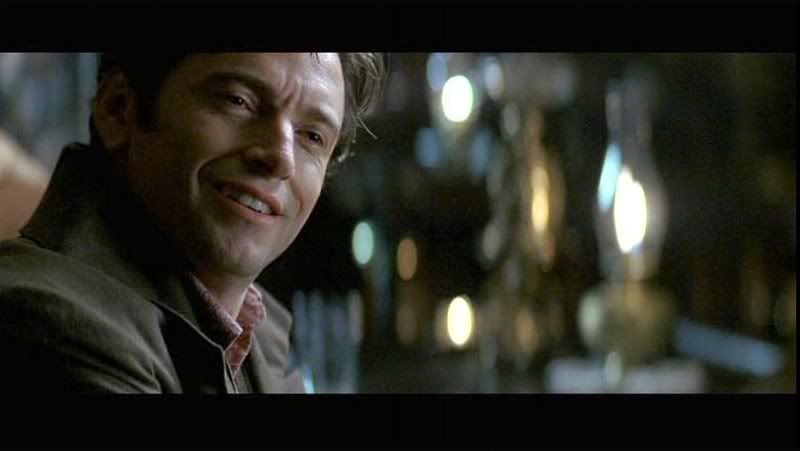
When Angier questions whether the constantly inebriated Root can pull off the act, Root demonstrates his ability to mimic the stage manner of the Great Danton, afterwards emphasizing the simplicity of it as in the past he had played such figures as Cesar and Faust.
The Great Danton introduces the act, blatantly called "The New Transported Man", describing to the audience the magic involved being a "technique from the orient" known to certain "Himalayan Holy Men". Angier and Cutter's version of the trick involves two free standing doors. Danton throws his top hat, opens one door, which masks him dropping beneath the stage through a trap door while simultaneously a lift raises Root to appear through the other door in time to catch the hat. The audience loves the act, but the downside is Angier is left under the stage during the Prestige, and does not personally receive the audience's applause. This merely furthers Angier's desire to learn Borden's secret. To this end, despite the success of the act, he sends Olivia to work as Borden's assistant and act as his spy. Olivia is hurt by this callous treatment, but she agrees.
In order to get Borden to trust her, Angier instructs Olivia to tell Borden the truth, which she does, describing how Angier performs the Transported Man (something Borden had already deduced), how Angier was obsessed with learning Borden's secret and sent her as a spy. But she points out to Borden that his act lacks style and he could use her help in selling the trick to the audience. With Olivia's help Borden designs "The Original Transported Man", which now incorporates a dramatic electrical device obviously built by Tesla.
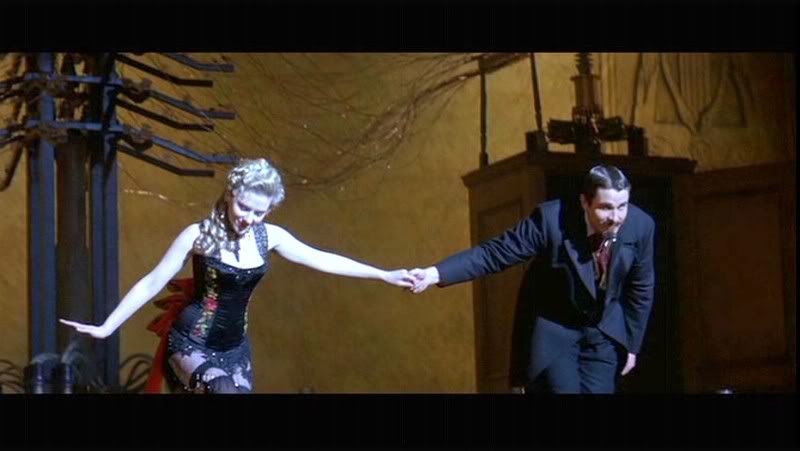
Borden performs this act at the Pantages Theater (which we may suppose was chosen as a name as a reference to Pan. From what I can gather there are only Pantages Theaters in North America, originally founded in the Vaudeville era by Alexander Pantages). Borden's stage is decorated with hieroglyphic-like designs, including a caducial image, twin serpents meeting at the crown of a man's head.
As Borden and Olivia garner success with the improved act, Root suddenly becomes aware of the power he holds over Cutter and Angier, and demands more money. Cutter wants Angier to stop performing the trick before it is too late. Root's awareness, we find out, came from a suggestion from Borden, who was directed to Root by Olivia. One night Angier performs the Transported Man and drops through the trap door, hitting the hard floor as Borden has moved his cushion aside, and Angier breaks his leg in the process. Instead of Root it is Borden (as The Professor) who emerges from the other door. He mocks Danton (even lowering a bound Root from a rope above the stage), and urges the audience to come see the real Transported Man across the street at the Pantages.
Angier confronts Olivia. Olivia states she now believes Borden uses a double for his act, as she's seen wigs and make-up about, but Angier doesn't believe her. She gives Angier Borden's notebook, but it is written in a code requiring a Five letter keyword to decipher it. Olivia admits to Angier that she has fallen in love with Borden, but this doesn't seem to much affect Angier personally. Angier does, however, stage a break-in to Borden's workshop to cover Olivia's part in the notebook disappearing.
Angier and Cutter lure Fallon into a trap, specifically tricking him into climbing up a false staircase that gives way, causing him to fall into an open crate/coffin which Cutter nails shut. Cutter gets shot in the arm in the process. Angier then ransoms Fallon to Borden.
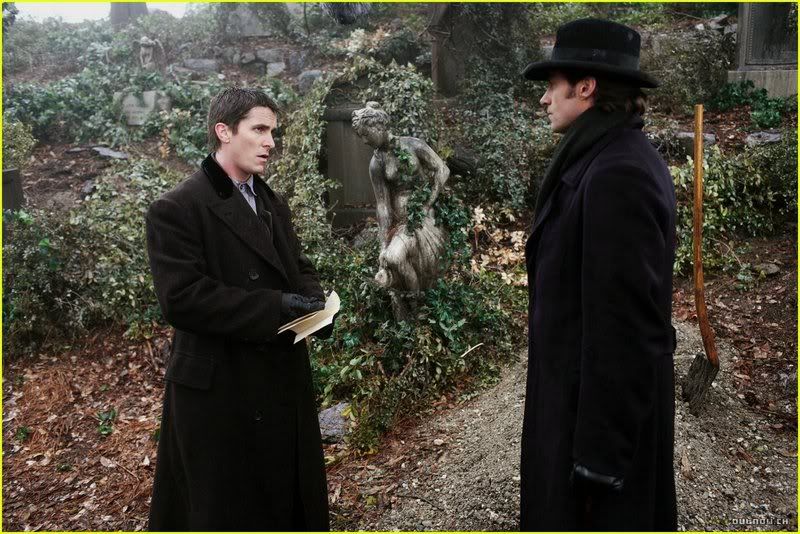
They meet in a cemetery and Angier demands the not just Borden's keyword, but his out-right method. Borden writes down the five letter name "Tesla", stating the Keyword is the Method (a statement of esoteric significance). Demanding Angier produce Fallon, the "disappearing man", Angier directs Borden to a shovel and a recently dug grave. As stated many times, there is no more obvious emblem of Mystery Initiation then a mock death/resurrection. That this occurs at the feet of a flora wreathed maiden positioned before an overgrown crypt door, a Door to the Underworld, making this Nature/Underworld maiden certainly either Persephone or her mother Ceres, might denote this shot as the single most important and revealing of this film.
This then brings Angier to the decision to travel to Colorado to seek out Tesla and employ him to construct a Transporting Machine as Angier now assumes Borden utilizes. Cutter opts out at this point, as he does not share Angier's obsessive passion, growing fearful of the rising stakes. Meanwhile Borden's life seems to be falling apart as his blatant affair with Olivia causes Sarah to grow increasingly depressed. But the source of her depression is not quite so simple, as it stems more from the fact that she has invariably deduced Alfred's Secret. That there is a Secret for her to have to deduce itself is the cause of her sadness. During a confrontation Borden stresses that Secrets are his life, his highest purpose.
In Colorado Tesla's Machine seems not to work. They zap Angier's top hat many times but nothing happens to it, the hat stays put. Angier reaches the end of Borden's diary and finds that Olivia in fact set him up, giving Angier a false diary at Borden's instruction. The Tesla angle is revealed to be a red herring, a trick to send Angier away to America (a long-term journey in the 1890s), making his rival "disappear". Angier now believes that Tesla and Alley have been playing him for a fool, taking his money (as Tesla's conflict with Edison straps his resources) and pretending to build a teleportation machine. Tesla insists he can build the device and tries another demonstration, this time with a living subject, Alley's Cat (certainly a pun). Alley puts up minor protest to this, though we might note the short leash and clip in the transporter subtly suggests this is not the first time the animal has been used in this way. Tesla zaps the cat, but like the hat it doesn't disappear. Angier leaves as Alley releases the cat from its leash. Outside Angier hears the sound of cats fighting, and investigating finds numerous identical top hats on the ground and a pair of identical cats. One might say Tesla here is a mad hatter. Do cats eat bats?
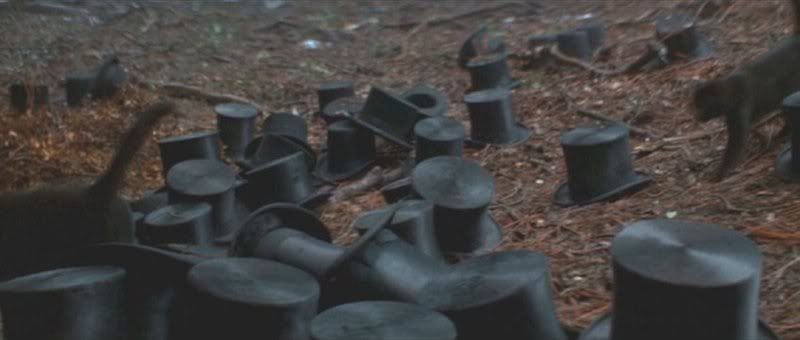
Apparently Tesla's machine does produce magic, but not in the way expected, not transporting an object, but making an exact duplicate at a position a short distance away. Unfortunately, not long after Tesla's lab is destroyed by Edison's men and Tesla and Alley forced to flee Colorado. But Tesla leaves the machine commissioned by Angier in a room at the hotel, encased in a trapazoidal box/pyramid without a capstone, in a ballroom decorated with Rose emblems along the ceiling (Sub Rosa). A note from Tesla urges Angier not to make use of the machine's magic, which Tesla worries can only lead to disaster.
After being gone for two years Angier returns to London with his new machine. He reunites with Cutter (contacting him through the device of the miniature playing card at the bottom of his glass, as stated in Part I, the King of Clubs/King of Wands). Angier wants to reintroduce the act. To preserve his secret (in a move Cutter reads as purely theatrical) Angier hires the blind stagehands, and further refuses Cutter entrance backstage during that portion of the show. Cutter arranges a demonstration of Angier's trick to influential promoter Mr. Ackerman. Angier steps into his machine, a circular cage positioned under wires, and a Tesla Coil in an arrangement I find reminiscent of a simple Tabernacle (or for that matter a Glass Spider). Lightning engulfs Angier and he disappears.
Ackerman is not impressed despite the theatricality of the device, not until Angier reappears beside him on the balcony, many yards and a flight above the point he disappeared from. To this Ackerman delivers what may be the key line of the film, "- it's very rare to see real magic...it's been many years-". He then insists Angier and Cutter disguise it, instructing them to " - give [the audience] enough reason to doubt it". Angier gets booked, and insists the act be limited to 100 shows, performed Five times a week.
It is Borden now who is mystified as the Great Danton's improved trick makes him the most popular theatrical act in London. Borden can tell Angier is falling through a trap door, but can not deduce how he reappears so quickly on the balcony. Fallon observes that behind the theater each night the blind stagehands take out a large crate and load it into a carriage to be transported away.
It is around this time that Sarah succumbs to her depression and hangs herself in Borden's workshop, on beam alongside several Caged Birds. In the aftermath of this sad event Olivia confronts Borden on his lack of emotion towards the death of his wife and the mother of his child. He tries to explain that he loved Sarah half the time and loved Olivia the other half. Olivia states that this was obviously not enough for Sarah and that it isn't enough for her either and she leaves Borden, taunting him as she goes with Angier's recent success and acclaim.
We now return to the scene presented at the film's beginning. The Great Danton prepares to perform the Transported Man while Borden in disguise sneaks back stage. Angier drops through the trap door into the water tank, rigged to close and lock. Angier drowns before Borden's eyes, but it is apparent now that Borden had nothing to do with it. Borden even tries to break the glass to save Angier but it is too late. Cutter catches him and Borden is arrested. At the morgue Cutter identifies Angier's body.
Then in his cell, Borden reaches the end of Angier's diary, which blatantly boasts of Angier winning, framing Borden to rot for Angier's murder. Borden then goes to say goodbye to Jess before his execution, accompanied by her new guardian Lord Caldlow. Despite what he read in Angier's diary Borden is shocked to discover Lord Caldlow is in fact Robert Angier.
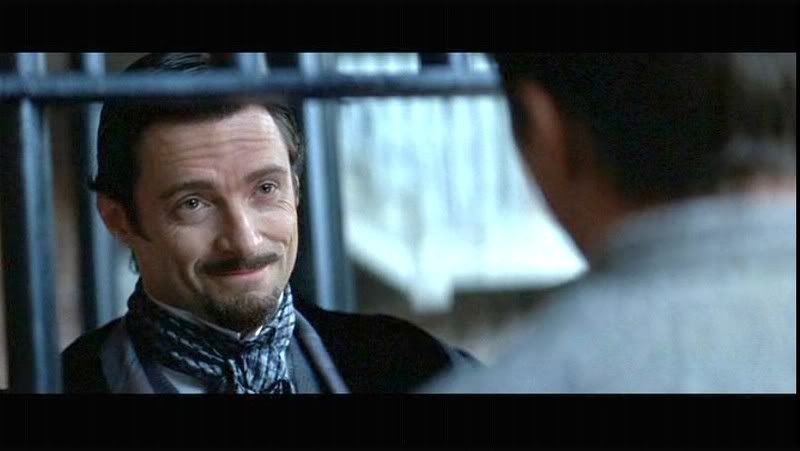
Or rather Robert Angier is really Lord Caldlow and always was. Note the devilish styling to Caldlow as he visits Borden in jail (remembering again how Bruce Wayne met Ra's al Ghul in jail). The name itself is indicative, Lord Called-Low. Shocked now that Angier would resort to this level, involving Jess, he hands him the description of his version of the Transported Man in desperate hopes of appeasing him, but Caldlow rips the papers up insisting no matter how Borden did it, his version's Secret was even better. He leaves with Jess as Borden swears he will escape and have revenge, and promises Jess he'll return to her.
Cutter was left in charge of dealing with Angier's possessions, most of which were purchased by Lord Caldlow. He tries to secure the Tesla machine for himself, but can't, and so bargains with Caldlow's lawyer (Owens) to deliver the items to Caldlow's estate personally so he can warn him not to use the machine. Cutter is shocked when he sees that Caldlow is Angier, and disgusted when Angier shows no remorse for framing Borden for murder. He further recognizes Jess as Borden's daughter.
Borden's last visitor is Fallon, and they part with Borden telling Fallon to live life for both of them. Cutter delivers the machine to Caldlow's warehouse. The machine is lowered into storage with ropes in scenes intermixed with Borden being hanged. His last word is Abracadabra. As Borden is executed, Fallon steps out of the shadows at the warehouse and shoots Angier in the chest. It is then shown that the shooter is actually Borden, and Cutter has assisted him in settling with Angier.
Angier now realizes that Cutter was right all along, and Borden performed the Transported Man by using a double, his perfect double, his Twin brother. Alfred Borden was a shared identity of Albert and Frederick Borden, taking turns being Borden and Fallon, keeping the Secret even from Sarah and Olivia. They took this to such a degree that when Angier shot the fingers off of one brother, the other severed his fingers as well.
And now we are shown the extremes Angier went to to win the rivalry. Tesla's machine really worked, really created duplicates. Not just a copy, but a duplication as real as the original, mind, body and soul, truly indistinguishable, in the case of a human being like Angier complete with full memory. Every time Angier used Tesla's machine a duplicate was generated. This necessitated Angier orchestrating a manner of removing the duplicates, so the Water Tanks were placed under the trap door, the man who disappeared each time drown, and the one who reappeared went on living the life of Robert Angier. To preform this real magic Angier must then must commit suicide, sacrificing himself every time.
Borden details the insane lengths that Angier went to, and states it was all for nothing. Angier replies that Borden never understood what the purpose of performing magic was to begin with. That the audience knew they were being tricked, that the world is really simple, miserable and solid, but that if you could fool them, even for a second, you could give them a moment to wonder. Angier states that seeing this occur with an audience, seeing the look on their faces, was something very special, the purpose of the magic. Angier then dies and as he does his leg kicks over a lantern which sets his warehouse on fire. Albert with Jess, he's her true father (it is Frederick who hanged and interestingly Frederick who was buried alive earlier in the film).
Angier's final speech reveals a couple of points. Ultimately, both Angier and Borden share a materialist world view, stressing the solidity of the world as a negative quality, something to be escaped. The Bordens underlying purpose was escaping their poverty-stricken background, not merely financially, but as a matter of status and personal quality. To this end they were brilliant at seeing and devising the mechanism of masterful illusions, means to escape. Angier/Caldlow came from an aristocratic background, he had no financial need to perform as a magician, but he did so under an assumed identity, indicating a desire to connect with the common man his rarefied world kept him separated from. His sense of showmanship and charisma made him a highly successful performer, though his act was always dependent on the devices of other men.
If you're still with me then I thank you for indulging my obsessions. We aren't quite finished. I mentioned "The Illusionist", which was on a surface level a very similar film also released in 2006, just months prior to "The Prestige". This happens from time to time, doesn't it, two movies with very similar topics released in short succession? And I think we always assume this phenomena is due to some matter of studio rivalry, and likely it is. But it also works to emphasize the underlying concepts. It is natural, and common, for "The Illusionist" and "The Prestige" to be compared, and inform one another. But "The Illusionist" is not the film I find most startling in this equation, but rather another movie from 2006 involving stage magic and several other pertinent details, and likewise starring Hugh Jackman and Scarlet Johansson, the Woody Allen comedy "Scoop".
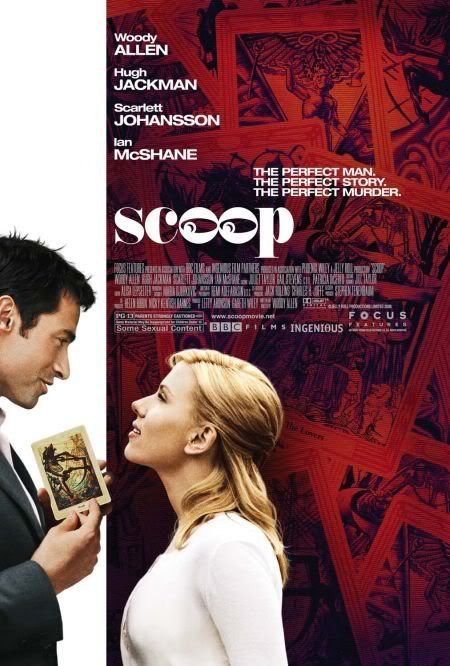
Now, this is more or less a light comedy without much in the way of sinister tones, but we can note the use of the Aleister Crowley designed Thoth Tarot deck. I promise not to present this movie scene for scene, but the plot of this film involves Scarlet Johansson's character Sondra Pransky, an American journalism student studying in London, who attends a performance by the Great Splendini, really Sid Waterman, played by Woody Allen. She's chosen from the audience to be the subject of a Disappearing woman act. While she's in the Box she is contacted by the spirit of recently deceased journalist Joe Strombel ("Deadwood's" Ian McShane). While being ferried across the River Styx to the Afterlife/Underworld Joe speaks to a woman who believes she was murdered by her employer, Lord Peter Lyman (Hugh Jackman), whom she suspects is a serial killer known as the Tarot Card Killer. This is the scoop of a lifetime, so Joe jumps off the Barge of the Dead in order to find a living journalist.
Noteworthy is the use of Drowning as plot device throughout the film. Sondra and Sidney are Americans in London with Jackman as an aristocrat. In "The Prestige" Jackman is an aristocrat pretending to be an American in London. "Scoop" further involves all the principle characters taking on alternate identities. With one small bit of translation, the Joker is himself a Tarot Card Killer. It is hard to see "Scoop" and "The Prestige" as anything but inter-referential, either purposefully on more amazingly on a synchronistic level. That Allen is quite a Joker.
And as stated what dark synchronicity as the magic channeled for "Batman Begins" and "The Dark Knight" bleeds into the real world, with tragic consequences resulting from obsessive pursuit of craft and perhaps manipulation of forces more dangerous then can be imagined, as depicted in "The Prestige". When a deal is made with the devil the price is always too high.
No comments:
Post a Comment